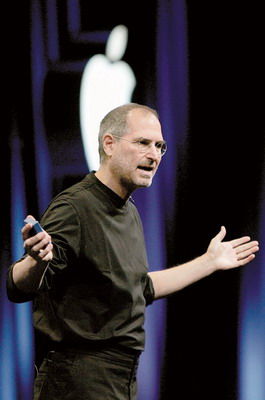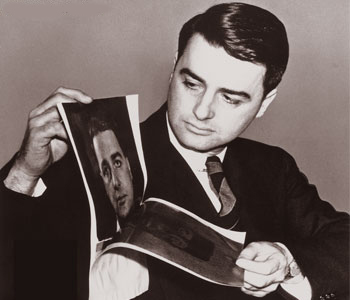 许多人包括克里斯托弗·波南斯 (纽约时报的编辑)和埃里克•卡洛尼厄斯 都表示乔布斯的许多设计的灵感都是受宝丽来相机的发明者和。乔布斯传记的作者Walter Isaacson 称乔布斯这样形容兰德,他称兰德是他童年时的偶像。一个宝丽来相机的老人最近详细介绍了乔布斯从兰德身上学到的东西。这些东西形成了苹果公司独特的文化,也燃起了乔布斯让这种文化延续下去的决心。
许多人包括克里斯托弗·波南斯 (纽约时报的编辑)和埃里克•卡洛尼厄斯 都表示乔布斯的许多设计的灵感都是受宝丽来相机的发明者和。乔布斯传记的作者Walter Isaacson 称乔布斯这样形容兰德,他称兰德是他童年时的偶像。一个宝丽来相机的老人最近详细介绍了乔布斯从兰德身上学到的东西。这些东西形成了苹果公司独特的文化,也燃起了乔布斯让这种文化延续下去的决心。
关于兰德和乔布斯两人的联系,Carl Johnson在最近的一篇专栏中详细介绍了这一点。Carl也是在20世纪80年代成为宝丽来相机世界广告部副总裁后才开始了解到两个人的联系的。
1.商业是艺术与科技的完美结合。这个理念渗透于兰德的宝丽来的方方面面,包括产品的工艺,广告和公司文化。
2.完美的公司是经理人和梦想家的结合,而前者应该是后者的保护神。将这条规律与其他公司相对比,无论是大公司还是小公司,很多时候两者都是在争抢控制公司的权利。
3.一旦事情已成定局,无论是不是所期望的,都要主动接受。不妨看一下苹果公司在发布产品后对待市场反馈的态度。
前两个感悟都是兰德和乔布斯对待创新的态度,这要求产品的设计者(艺术家或者是梦想家)要有善于发现的眼睛。这也在John Scullley的一篇文章中得到了印证,在兰德被迫离开宝丽来时,他曾和乔布斯一起去拜访过兰德:
“我们围坐在一张会议室桌子周围,兰德先生说,其实那些伟大的产品比如宝丽来相机并不是我们任何人的发明;它们一直都在我们面前,只是隐身在某个地方,等着我们去发现它们。
 乔布斯立刻联系兰德的说法,表示这就是为什么他在开发一个新产品时从来不做消费者调查的原因,因为它相信自己的直觉,这种直觉能够使他能够看到别人看不到的东西。乔布斯还说,他认为Mac也是一直都存在的东西,只是其他人都看不到它,它是在等着我找到它,并把它展现给世人看。”
乔布斯立刻联系兰德的说法,表示这就是为什么他在开发一个新产品时从来不做消费者调查的原因,因为它相信自己的直觉,这种直觉能够使他能够看到别人看不到的东西。乔布斯还说,他认为Mac也是一直都存在的东西,只是其他人都看不到它,它是在等着我找到它,并把它展现给世人看。”
就像艺术大师米开朗琪罗所说的那样:“每一块石头里都住着一尊雕塑,雕刻家的任务就是发现这些雕塑。”兰德和乔布斯都把自己想象成了是雕刻家,并且希望自己的公司有着各种身怀绝技的雕刻家。
而第三条,则反映出兰德和乔布斯对完美的不屑追求,包括采用科学的方法反复试验,检查市场反馈意见。
还有一条可能也是乔布斯从兰德和宝丽来相机得到的启发:
4.一个公司,在失去了一位能够清晰定义公司文化的领导人之后,很快就会衰败的。在兰德离开宝丽来相机后的八十年代到九十年代之间,宝丽来相机经历了破产重组。
Carl Johnson最近表示,乔布斯根据宝丽来公司的管理模式,预料到了后来的破产重组。以下是Johnson描述乔布斯在宝丽来公司的一段讲话:
很不幸,我没有被邀请参加这次会议,但是我还是知道了。接下来乔布斯公开谴责宝丽来管理的失误造成了兰德的被迫离开。他说,没有了兰德的宝丽来接如同是一家烟草公司,也就是说一旦公司迷失了方向,也不再是任何人的责任。
看到宝丽来相机的下场,乔布斯十分努力的工作,来帮助苹果避免走宝丽来相机的老路。所以在2008年,乔布斯招聘了耶鲁大学商学院院长Joel Podolny来共同经营苹果公司。Podolny搬进了乔布斯和库克中间的一间办公室,那时库克就已经被认为是乔布斯的继任者了,同时库克负责帮助苹果内化乔布斯的所有理念,为乔布斯的离开做准备。
但是这项任务可以被看做是教授苹果的员工怎样用乔布斯的思维来解决将来遇到的问题。但是在我看来,这是一个错误的决定。因为如果想成为一个下棋高手,光凭记住别人的招数是不够的。因为在董事会中有太多的人事变动。反过来,你应该学会去掌握游戏规则,比如如何控制进度,结构和速度。
同样,如果苹果想在未来的市场中继续创造新的成功,苹果公司未来的新一代领导人就必须要学会乔布斯的游戏规则,但是要自己做决定。总是问“乔布斯会怎么做?”是不会有任何作用的,因为他们不可避免的要遇见乔布斯不曾遇到过的情况和市场波动。然而,他们能够做的是,要遵守乔布斯所认为对苹果文化最基本的东西,这样才可能成功。
换言之,乔布斯的继任者能否坚持住乔布斯从兰德身上学到的东西,这是苹果能够继续走向更大的成功的关键因素。
Several observers, including Christopher Bonanos and Erik Calonius, have pointed out that Steve Jobs was greatly inspired by Edwin H. Land, the inventor of instant photography and founder of Polaroid. Walter Isaacson, in his biography of Steve Jobs, quotes Jobs as saying that Land was one of his childhood heroes. A Polaroid veteran’s recent accounts detail the lessons that Jobs took from Dr. Land. These lessons would shape Apple’s culture and fuel Jobs’ determination to help that culture survive his own death.
The insights on the Jobs/Land connection were offered in a recent column at Ad Age, by Carl Johnson that is well worth reading and in subsequent conversations. Johnson should know; he learned them himself from Edwin Land when he became VP of worldwide advertising at Polaroid in the early 1980s:
1. Business should be at the intersection of art and science. Johnson says that this extended to everything that Land did at Polaroid, including how he crafted the products, advertising and corporate culture.
2. The ideal business is composed of managers and dreamers, and it is the responsibility of the former to protect the latter. Contrast this with what we see at most companies, both large and small, where the managers and dreamers are in a constant struggle for control.
3. When the facts come home to roost and they are not what you expect, reach out and embrace them anyway. Compare this with Apple’s rigorous attention to market feedback after product launch.
The first two lessons embody both Land and Jobs’ attitude towards innovation, which is that it requires a great designer’s (or artist’s or dreamer’s) eye to spot. This was confirmed by John Sculley, in the same essay that I cited in an earlier post on inventing the future. Sculley recalls a visit he and Steve Jobs made to Edwin Land, after Land had been pushed out of Polaroid:
As we sat together around a large conference table Dr. Land remarked that great products like his Polaroid instant camera aren’t really invented by any of us; they’ve always existed, right there in front of us, invisible—just waiting to be discovered.
Steve Jobs immediately connected with Dr. Land’s observation, saying the reason he never did consumer research when he built a new product is he trusted his own instincts more than others who couldn’t see what he saw. Steve agreed with Dr. Land’s point of view saying he felt that the Mac too had always existed; invisible to the rest of us, just waiting for Steve to come along and reveal it.
As Michelangelo said, “Every block of stone has a statue inside it and it is the task of the sculptor to discover it.” Both Land and Jobs thought of themselves as master sculptors, and they wanted to make sure that their organizations were infused with other sculptors, too.
The third lesson reflected both of their relentless drives for perfection, which included taking a scientific approach to experimentation and market feedback.
There’s another lesson that Steve Jobs probably took away from Lands’ experience at Polaroid as well, which might be phrased as:
4. Companies quickly deteriorate after they lose leaders that define their culture. After the loss of Edwin Land, Polaroid went on a steep decline in the 80s and 90s, culminating in several bankruptcies and reorganizations.
Carl Johnson recently told me that Jobs predicted—to Polaroid’s management—that this would happen. Here’s how Johnson described a later visit that Jobs made to Polaroid:
Unfortunately, I wasn’t invited to the meeting, but I certainly heard about it. Reportedly, Jobs scolded the management for ejecting Land and called the company without Land “a vanilla corporation,” meaning, “you’ve lost your way and don’t matter anymore.”
Faced with a clearer sense of his mortality than most others knew, Steve Jobs worked diligently to help Apple avoid the same fate after his own departure. He recruited Joel Podolny, the dean of the Yale Business School, to establish Apple University in 2008. Podolny moved into the office between Jobs and Tim Cook, who would later replace Jobs as CEO, and was tasked to “help Apple internalize the thoughts of its visionary founder to prepare for the day when he’s not around anymore.”
While this charter might be interpreted as teaching Apple executives to channel Steve Jobs in their future decision making, I think this would be a mistake. You can’t become a great chess player by just remembering all the moves of all the games that a grandmaster has played. There are just too many board combinations. Instead, you have to learn the underlying principles that guided those games, like controlling space, structure and tempo.
Likewise, to be successful, Apple’s future generation of leaders will have to learn from Steve Jobs’ games but make their own decisions. Asking “
What would Steve do?” won’t work, they will inevitably confront circumstances and market dynamics that won’t match those that Steve Jobs deciphered. What they can do, however, is to maintain the principles that Jobs believed to be fundamental to the culture, and therefore the success, of Apple.
In other words, can Steve Jobs’ successors hold true to what Jobs learned from Edwin Land? That will be a key leading indicator of Apple’s continued success.
 许多人包括克里斯托弗·波南斯 (纽约时报的编辑)和埃里克•卡洛尼厄斯 都表示乔布斯的许多设计的灵感都是受宝丽来相机的发明者和。乔布斯传记的作者Walter Isaacson 称乔布斯这样形容兰德,他称兰德是他童年时的偶像。一个宝丽来相机的老人最近详细介绍了乔布斯从兰德身上学到的东西。这些东西形成了苹果公司独特的文化,也燃起了乔布斯让这种文化延续下去的决心。
许多人包括克里斯托弗·波南斯 (纽约时报的编辑)和埃里克•卡洛尼厄斯 都表示乔布斯的许多设计的灵感都是受宝丽来相机的发明者和。乔布斯传记的作者Walter Isaacson 称乔布斯这样形容兰德,他称兰德是他童年时的偶像。一个宝丽来相机的老人最近详细介绍了乔布斯从兰德身上学到的东西。这些东西形成了苹果公司独特的文化,也燃起了乔布斯让这种文化延续下去的决心。
 乔布斯立刻联系兰德的说法,表示这就是为什么他在开发一个新产品时从来不做消费者调查的原因,因为它相信自己的直觉,这种直觉能够使他能够看到别人看不到的东西。乔布斯还说,他认为Mac也是一直都存在的东西,只是其他人都看不到它,它是在等着我找到它,并把它展现给世人看。”
乔布斯立刻联系兰德的说法,表示这就是为什么他在开发一个新产品时从来不做消费者调查的原因,因为它相信自己的直觉,这种直觉能够使他能够看到别人看不到的东西。乔布斯还说,他认为Mac也是一直都存在的东西,只是其他人都看不到它,它是在等着我找到它,并把它展现给世人看。”
